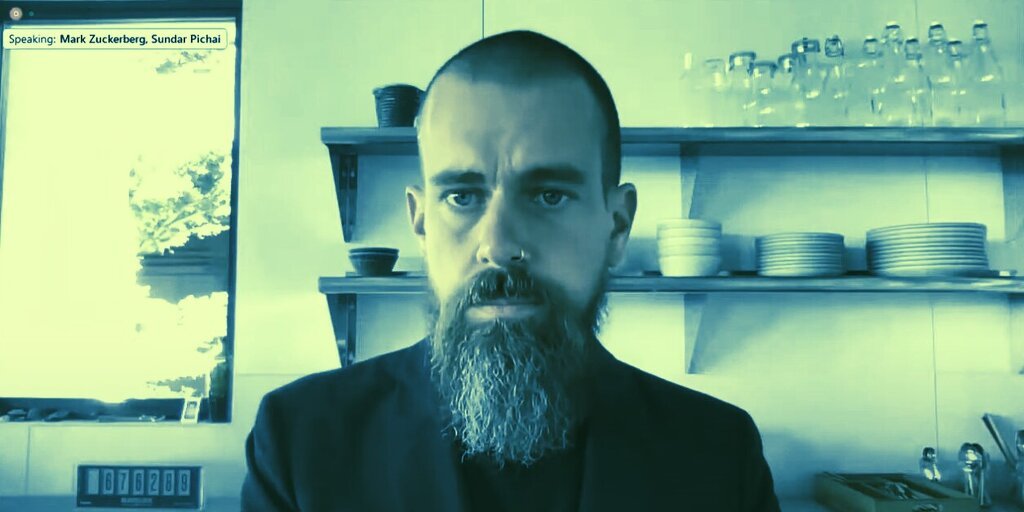Musk and Dorsey Blast Web3 as ‘Centralized’ Gimmick Controlled by Venture Capitalists

In brief
Former Twitter CEO Jack Dorsey threw some spicy tweets at Web3.
His outburst drew in many other prominent figures, including Elon Musk.
Two of the biggest names in crypto and Silicon Valley—Tesla CEO Elon Musk and Square CEO Jack Dorsey—took to Twitter on Monday night to fire shots at Web3 and the powerful venture capital firm that has done most to promote it.
Dorsey laid the table for the dust-up earlier in the day when he replied to a tweet from the rapper Cardi B, who had asked if crypto might replace the dollar. Dorsey’s take? Bitcoin will. Bitcoin, not “crypto.”
Dorsey’s reply is just the latest reminder of his staunch Bitcoin-only stance.
Hours later, Dorsey—who until last month was also CEO of Twitter—began venting in earnest when he took aim at Web3, which has become a buzzword that its evangelists use to describe a new era of the Internet that will replace powerful tech companies with a decentralized system of blockchains. The primary proponent of the vision has been VC firm Andreessen Horowitz (a16z) and its allies, leading Dorsey to tweet this:
You don’t own “web3.”
The VCs and their LPs do. It will never escape their incentives. It’s ultimately a centralized entity with a different label.
Know what you’re getting into…
— jack⚡️ (@jack) December 21, 2021
Dorsey’s tweet prompted Musk to throw his own jab at Web3, and the pair engaged in a back-and-back forth that called out a16z more directly:
The tweets led other prominent Silicon Valley figures to join the conversation, including a gaggle of a16z figures who rushed to defend their Web3 project.
Those defenders included Chris Dixon, a partner at the VC firm, who is one of the most prominent investors in crypto and who has published a series of recent Twitter threads exalting Web3. After Dorsey’s initial tweet, Dixon attempted the popular Gandhi “first they ignore you” quote, but Dorsey was having none of it, blasting the VC’s attitude as phony and sanctimonious.
You’re a fund determined to be a media empire that can’t be ignored…not Gandhi.
— jack⚡️ (@jack) December 21, 2021
The high-profile beef over Web3 soon drew in other prominent Silicon Valley figures, including Box CEO Aaron Levie and the outspoken VC Jason Calacanis, both of whom sided with Dorsey.
Not everyone took Dorsey’s side. Those included Andreessen Horowitz’s allies, of course, but also people on Twitter who suggested he is blinded by a Bitcoin-only mentality. Others called him a hypocrite for having accepted plenty of venture capital money to start his own companies.
We have bigger issues if a tweet stifles hopes and dreams. Currently it’s not wrong. Critique can help fix, or divert energy to something more important.
— jack⚡️ (@jack) December 21, 2021
Dorsey took the pushback in stride, suggesting Web3 advocates are thin-skinned, and doubling down on his warnings about venture capitalists’ thirst for control:
Meanwhile, some people jumped into the debate with some data that suggests Web3 is not as decentralized as its proponents suggest. This included a tweet citing the research firm Messari that shows how a large proportion of the tokens tied to some of Web3’s most popular projects are controlled by VCs and other insiders:
As of Tuesday morning, Dorsey was still feuding with various influential figures in crypto, including ShapeShift founder Erik Voorhees:
Dorsey also smoothed things over somewhat with Dixon of a16z, saying “I believe in you and your ability to understand systems. It’s critical we focus our energy on truly secure and resilient technologies owned by the mass of people, not individuals or institutions.”
So what to make of all this? On one hand, you can look at the dust-up between Dorsey, Musk and the others as just another of the beefs that bubble up on Crypto Twitter every day of the week.
But at the same time, this particular Twitter fracas also represents something more: maybe the smartest challenge to date of the Web3 idealism that many in the crypto world tout like religious gospel. Dorsey is one of the few people in the crypto space with the track record and power—he is in the process of turning Square into a Bitcoin-first company—to challenge Andreessen Horowitz’s plans for the next phase of crypto.
At the same time, though, Dorsey’s shot across Web3’s bow may also be rooted in self-interest: Both companies he founded, Square and Twitter, exemplify the Web2 era and may face an existential threat of a more decentralized technology stack. Look for this debate to continue in 2022.
And on a final note, Neeraj Agrawal of Coin Center spoke for many on the east coast who woke up to discover they had missed all the juicy action.
incredibly rude to start juicy beefs on pacific time
— Neeraj K. Agrawal (@NeerajKA) December 21, 2021



